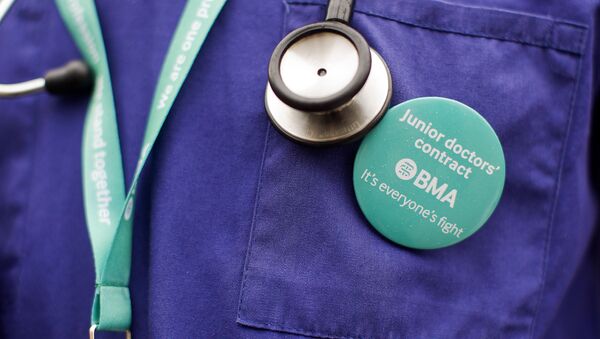Following a breakdown in negotiations between the Government and the BMA (British Medical Association), thousands of junior doctors have walked out of Accident and Emergency, intensive care and maternity units across England.
Supporting our #juniordoctors at Charing Cross Hospital #NHS #JuniorDoctorsStrike #juniorcontract #Fulham #LBHF #W6 pic.twitter.com/0JikXX3xj0
— Save Our Hospitals (@savehfhospitals) April 26, 2016
Amazing turnout at the #BRI picket for the #JuniorDoctorsStrike + loads of support from the public despite the press pic.twitter.com/vjPht6m3qE
— William Quick (@willhquick) April 26, 2016
Tuesday morning, the UK Health Secretary Jeremy Hunt told the BBC that this would likely be his last major role in politics, conceding that he had become an unpopular figure:
"Health secretaries are never popular. You're never going to win a contest for being the most liked person when you do this job. But what history judges, is ‘did you take the tough and difficult decisions that enabled the NHS to deliver high quality care for patients?' "
Today I'm joining the #juniordoctors this govt shouldn't force unfair unsafe contracts! #JuniorDoctorsStrike pic.twitter.com/bXsw1fRP19
— Michael Spence (@EducationMcr) April 26, 2016
Much of the current dispute centers around the UK Government's desire to implement a "7 day National Health Service" — something which the BMA says has been poorly thought through, and could stretch doctors' working hours to dangerous levels, putting patients at risk.
The Health Secretary's Parliamentary Oral Statement on #juniorcontract is now online: https://t.co/bGf1qOpuok
— DH Media Centre (@DeptHealthPress) April 25, 2016
The Health Secretary described it as a "very, very bleak day" for the NHS, and continues to argue that the actions of junior doctors are irresponsible, and potentially life-threatening.
A spokeswoman for the BMA told Sputnik that junior doctors had been left with "no alternative" but to take strike action:
"They've had meetings, they've had negotiations, they've made compromises, they've had industrial action which does provide emergency care, and the Government has refused to get back round the table and end the dispute through talks. So, Junior Doctors feel like this is an absolute last resort, and not an action any of them would want to take — but it's an action they feel they have no other option but to take."
She added: "We've given trusts quite a lot of notice to plan ahead, in advance. There will of course be other senior doctors and NHS staff providing emergency care today, and a lot of junior doctors are of the view that they wouldn't be taking this action if they felt that it was endangering their patients in any way.
"What they're doing is short-term disruption really, to protect patient care in the longer-term. It's also important to say that there is an agreed escalation process between ourselves and NHS England, so if a trust does have a serious unpredictable incident, and they feel like they need to ask junior doctors to return to work, there is an agreed process in place for that to happen," the BMA spokeswoman told Sputnik.
Further strike action is planned for Wednesday, between the same hours.
The saddest day in NHS history, entirely avoidable if SoS was willing to talk to junior doctors #JuniorDoctorsStrike pic.twitter.com/lLCItYY51J
— johannmalawana (@johannmalawana) April 26, 2016
But as for future strikes, the BMA told Sputnik it has yet to reach any decision — but with little suggestion that the Government will back down, further industrial action is a very real prospect:
"We'll have to assess the situation once these two days of action have finished, and see what options are open to us, and what action, if any, we want to take next. So at the moment there's a question mark over that, but no decision has been made."


